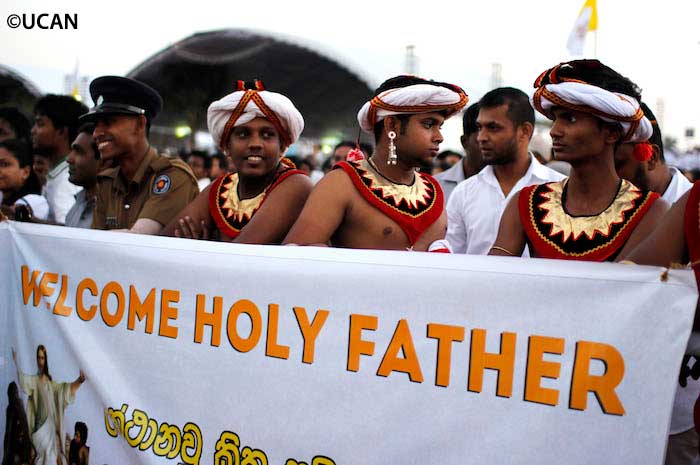|
Joy of papal visit, promise of democracy lift spirits in Sri Lanka Pope Francis' message, the bishop suggested, was like a prelude to what the people expect from the new government. NEW YORK—Joy and gratitude mark the Sri Lankan Church’s assessment of the Jan. 13-15 visit of Pope Francis—a spiritual high-water mark that came on the heels of an upset presidential election that holds the promise of reform and democracy. “The Pope was not only welcomed by Catholics, who are, after all, a minority in Sri Lanka, but also by many fellow Sri Lankans who belong to other religious denominations. The Holy Father was greeted by millions during the approximately 12 mile journey from the airport to Colombo City,” Bishop Valence Mendis told international Catholic charity Aid to the Church in Need. The head of the Diocese of Chilaw, in the western part of the country, added: “We had expected that the Jan. 14 Mass would be attended by up to 500,000 visitors. In the end, twice as many came, including many non-Catholics.” The prelate cited two highlights: the canonization of Joseph Vaz, Sri Lanka’s first saint; and the papal stop at the Marian pilgrimage site of Madhu. As to the vote that ousted the presumed favourite, the bishop said: “Many hoped for this and thus voted for change. Now expectations are high that the new government will make the dreams of the people come true.” Long considered the favorite to win another term, President Mahinda Rajapakse—who observers say had begun to show some dictatorial tendencies— lost the Jan. 8 election to former Minister of Health Maithripala Sirisena, an outspoken champion of democracy.
In retrospect, Bishop Joseph Rayappu of Mannar said that the timing of the election turned out to be perfect, even though the Sri Lankan bishops’ conference had petitioned the government to postpone the election to avoid a distraction from the papal visit. Pope Francis’ message, the bishop suggested, was like a prelude to what the people expect from the new government. He said: “The Pope called for reconciliation, solidarity and peace. Following the change in government, hopes are now high that the new government will guarantee press and judicial freedom as well as minority rights. “Sri Lanka is diverse, not only ethnically but also in terms of culture, language and religion. The new government—the first in which Sinhalese, Tamil and Muslims are all represented—has to recognize this truth and take it into account politically.” Deep wounds have barely begun healing. Only few years have passed since Sri Lanka’s civil war ended in May 2009. It is estimated that more than 100,000 people died in the conflict—the majority on the Tamil rebel side—most of them in the final months of the war. In 2010, a reconciliation commission was established to deal with atrocities committed by government troops in the northern and eastern parts of the island nation. Around 70 percent of the population of 21 million Sri Lankans are Buddhist; 12 percent are Hindu; about 10 percent are Muslim; and some 8 percent Christian, the bulk of them Catholics. Ethnically, the country is less diverse: 75 percent are Sinhalese, about 15 percent Tamil; and about 10 percent are referred to as Moors, who are mostly Muslim. Even though the Catholic Church only represents a small minority of the population, it has taken on a key role: it is the only religious denomination that counts members from all the various ethnic groups among its faithful.
UCAN photo: warm welcome for Pope Francis in Sri Lanka |
|
|
|

